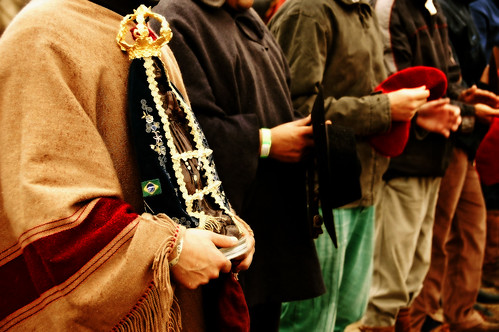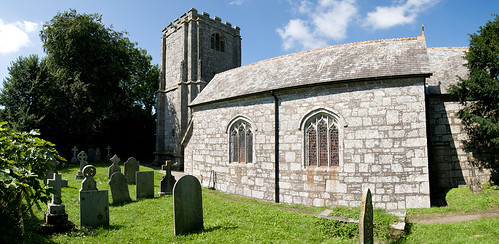Gender: Feminine
Usage: Breton
Meaning: "token of the egg" (unconfirmed)
(KLAYR-vee)
This quirky-cool Celtic name belongs to about 800 French citizens, with 200 more named Clervie: the sleek French spelling.
Clever Klervi (pronounced "Claire-vee") is the recently revived Breton form of Creirwy, a Welsh name of somewhat disputed meaning, which in legend belonged to the beautiful daughter of Ceridwen.
Saint Klervi was the younger sister of the great Saint Winwaloe, founder of Brittany's first abbey. In fact, all of Winwaloe's immediate family are regarded as saints, including their mother Gwen "the Triple-Breasted" (!!!). This semi-legendary family migrated from Britain to Brittany (then Armorica) in the 5th or 6th century AD.
Klervi, a patron of the blind, is remembered in connection with a surreal incident from her girlhood. Equal parts silly and morbid, the ancient legend of Saint Klervi involves an eyeball and an unsavory goose, and could be a Brothers Grimm fairy tale for all its ridiculousness.
Showing posts with label saintly. Show all posts
Showing posts with label saintly. Show all posts
06 June 2012
22 May 2012
Aparecida
 Gender: Feminine
Gender: FeminineUsage: Brazilian
Meaning: “appeared”
(ah-PAH-reh-SEE-dah)
Aparecida is taken from the Brazilian Portuguese title of the Virgin Mary Nossa Senhora Aparecida meaning “Our Lady Who Appeared.” It is ultimately derived from the Latin verb apparere “to appear, come in sight, make an appearance” (itself from the elements ad- “to” + parere “to come forth, be visible”).
Aparecida is, first and foremost, the name of a statue, which gave its name to the church containing it and eventually to the village that grew up around the church.
23 April 2012
Wenna
 |
| Church of St Wenn, Cornwall |
Wenna is a vernacular form of the Cymric classic Gwen, which means "white, fair, blessed". It comes to us from the Cornish—those same Celts who famously reinterpreted the related Welsh name Gwenhwyfar as Jennifer.
10 September 2011
Sidonia
 |
| Burne-Jones, Sidonia von B. |
Usage: Late Latin, German, Romanian
Meaning: “woman from Sidon”
This austere beauty has won me over, first piquing my interest with the tragic story of Sidonia “the Sorceress” von Borcke, Pre-Raphaelite antiheroine, and then further hooking my imagination as the birth name of Colette (in its French form Sidonie, that is – see doh NEE).
Sidonia is only marginally less obscure in Germany and eastern Europe than in the English-speaking world, but wherever a Sidonia went, she’d be a rarity. For a class act with a rock-solid pedigree (i.e., gravitas) and the slightest touch of gloom, read on.
Labels:
gothic,
medieval,
saintly,
witchy woman
Subscribe to:
Posts (Atom)
